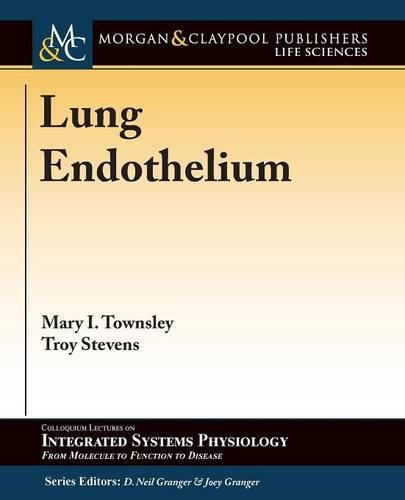Readings Newsletter
Become a Readings Member to make your shopping experience even easier.
Sign in or sign up for free!
You’re not far away from qualifying for FREE standard shipping within Australia
You’ve qualified for FREE standard shipping within Australia
The cart is loading…






Pulmonary endothelium forms the inner lining of blood vessels, where it interprets the complex mechanical and chemical environment within the circulation and adjusts its behavior to facilitate vascular homeostasis. Although endothelium fulfills many essential functions, including regulation of vascular pressure, circulating cell transmigration, coagulation, and hormone metabolism and/or delivery, a principal role is to form a semi-permeable barrier that limits fluid, solute and macromolecular access to the interstitial space. Physiological properties that govern such permeability characteristics are defined by the Starling equation, which assumes that endothelial cells throughout the circulation are all alike. However, in recent years it has become evident that endothelial cells in pulmonary arteries, capillary and veins are heterogeneous in structure and function. Here, we review evidence for endothelial heterogeneity among these pulmonary vascular segments, and consider the implications for such heterogeneity in lung fluid balance, especially as it relates to the Starling equation.
$9.00 standard shipping within Australia
FREE standard shipping within Australia for orders over $100.00
Express & International shipping calculated at checkout
Pulmonary endothelium forms the inner lining of blood vessels, where it interprets the complex mechanical and chemical environment within the circulation and adjusts its behavior to facilitate vascular homeostasis. Although endothelium fulfills many essential functions, including regulation of vascular pressure, circulating cell transmigration, coagulation, and hormone metabolism and/or delivery, a principal role is to form a semi-permeable barrier that limits fluid, solute and macromolecular access to the interstitial space. Physiological properties that govern such permeability characteristics are defined by the Starling equation, which assumes that endothelial cells throughout the circulation are all alike. However, in recent years it has become evident that endothelial cells in pulmonary arteries, capillary and veins are heterogeneous in structure and function. Here, we review evidence for endothelial heterogeneity among these pulmonary vascular segments, and consider the implications for such heterogeneity in lung fluid balance, especially as it relates to the Starling equation.